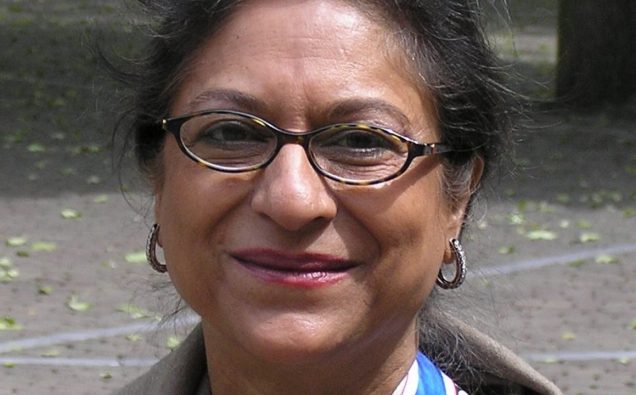
Photo: Asma_Jahangir_Four_Freedoms_Awards/Wikimedia Commons
Views and News Editorial
She stood like a rock against two military regimes, entrenched societal injustices and the militant mindset – and on all these fronts she achieved remarkable success as a champion of human rights.
Advocate Asma Jahangir, who passed away in her hometown Lahore of cardiac arrest, symbolized an indomitable spirit in the face of state intimidation, society’s suffocation of women’s rights and discrimination against minorities.
Not that she was alone in Pakistan’s struggles for democratic values like human dignity and equality – many honest intellectuals, writers, journalists, politicians and activists fought for Pakistan’s democracy and braved jail terms, house arrests and state pressures.
Jahangir remained a steadfast and leading legal voice – like a constant against ups and downs that political figures like Benazir Bhutto and Nawaz Sharif experienced including their ousters from the prime minister’s house under Zia ul Haq’s anti-democracy constitutional amendments in the 1990s and exiles during much of the 2000s under Pervez Musharraf’s military rule.
It was the ominous start of the 1980s – with the many manifestations of societal vibrancy buckling under Zia ul Haq’s draconian rule – that set the stage for Jahangir’s activism. Perhaps the crisis demanded a fierce and courageous collective response in the form of a movement – Movement for Restoration of Democracy – not just from Pakistan Peoples Party and allied democratic voices but also from representatives of legal fraternity. Asma Jahangir stepped in without fear.
Her establishment of the Women’s Action Forum in 1981 turned out to be a milestone in the fight for women’s rights as citizens with equal rights. Her bold opposition to discrimination against women under Zia ul Haq’s Hudood Ordinance and her contribution to efforts to give women the right to marry without patriarchal permission of male members of the family, secured her a unique distinction.
She was also a defender of the rights of the missing persons, and successfully defended two members of the Christian minority against allegations of blasphemy in mid 1990s. Asma Jahangir even stood up for MQM chief Altaf Hussain’s right to freedom of speech when the government banned him following his anti-Pakistani outbursts.
As president of the Supreme Court Bar Association, leader of the Human Rights Commission, founder of the WAF, and as advocate for rights of minorities, Asma Jahangir lived a life full of activism in fearless defense of the rule of law, democratic values and civilian rule.
Her activism and courageous services – acknowledged nationally and internationally – will remain relevant and a source of inspiration for those seeking to return Pakistan to Quaid-e-Azam’s progressive vision vs parochialism and violent extremism haunting the country despite having two successive democratic government rules.
The current challenges facing Pakistan – like the “dharnas” or sit-ins staged by extremist religious groups that recently choked the federal capital and Lahore, and the PML (N)’s caving into their unlawful demands – and the plight of women and minorities in many parts of the country are emblematic of the struggles that Pakistan society has to wage for a long time to come. In Asma Jahangir’s life, they have a real example of steadfastness, courage and lifelong dedication to follow.
















